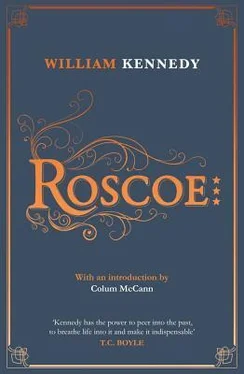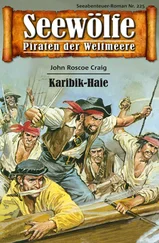“Let’s fight the Governor,” Roscoe said.
“Cheatin’ sonofabitch,” Patsy said.
“You’re a bad loser,” Bindy said.
“This isn’t over,” Patsy said.
“You want your money back, welsher?” And Bindy took the cash from his pocket and tossed it at Patsy, who caught it, undid the rubber band, riffled the wad of thousand- and five-hundred-dollar bills.
“You get a rematch anytime you want it,” Bindy said.
Patsy pocketed the money and turned to Roscoe, trying seriously not to smile.
“Better get that little lady’s story in writing,” he said.
Roscoe called Veronica and told her his news so she wouldn’t discover it in the newspapers, the way she discovered the Gilby scandal-mongering.
“They’re going to say I was consorting with whores,” Roscoe said. “But I wasn’t. This was political business, strictly. Do you believe me?”
“Do you ever go with whores?”
“No.”
“But you did.”
“Years ago. Years. I go with you, or I like to think I do. I want only that. You’re the only woman in my life.”
“What makes a woman be a whore?”
“Need, money, bad luck, stupidity, a fondness for pimps, sometimes too much talent for sin.”
“Do I have that talent?”
“You have a bit of it. I like to think that you have a talent for love.”
“So do you,” she said.
The daily Times-Union and Knickerbocker News carried subdued front page reports on the raid on the Notchery and six other brothels operating cautiously, but not cautiously enough, and listed the names of those arrested. Both papers carried photos of Mame and Pina on inside pages, none of Roscoe, Bindy, or Mac. The Sentinel , printing its edition two days before its usual publication day, obviously with inside information, used banner headlines with photos of Roscoe, Bindy, and Mac on page one, and half a page of whore photos inside. The paper also had, exclusively, the addresses of every whorehouse in town, the number of whores working in each house, and names of madams and owners of each building in which a house operated. Hattie Wilson was listed as an owner. “Upper-echelon members” of the McCall political machine were said to have masked financial interest in the real estate. Elisha was not mentioned. An unnamed Governor’s spokesman called this a major crackdown on prostitution controlled by the Albany political machine. The Notchery, he said, was the collection point for money from all the brothels in the city. The Sentinel also carried an editorial calling the raids an overdue move to clean up the city, so sullied by wartime transients who used the city as a sewer. It argued for throwing out the Democratic scum in the upcoming election.
Patsy reacted by having the city fire commissioner condemn Roy Flinn’s S entinel building for multiple transgressions of fire and building ordinances that would keep Roy in court for years. He also had two dozen rats trapped at the city dump and then let loose into the Sentinel ’s basement, with witnesses calling the infestation a neighborhood menace to children, and a photographer on hand to document the rats. Bindy gave Patsy his movie of the Governor’s aide, in hose, bedded with three women, with a transcript of their conversation; and this was sent anonymously to the Governor, to newspapers, radio stations, and the Albany Catholic Diocese. By day’s end the aide had resigned.
The dailies sought second-day comment from mayoral candidates, and Republican Jay Farley deplored the brothels and cheered their closure. Alex, who had returned to Fort Dix for discharge, issued a statement in absentia saying he favored a postwar renewal of moral purpose, and would pursue it upon his return. Cutie LaRue said the brothels should stay where they were. “If you take away the opportunity to sin,” he said, “you also take away the opportunity not to sin, which eliminates the opportunity for virtue. Those places should exist so we don’t have to visit them.”
Albany County District Attorney Phil Donnelly announced he was empaneling a grand jury to investigate the Governor’s police methods — hanging men out of windows, using degenerate dope fiends as informants against private citizens. O.B. announced Pina’s arrest for second-degree murder, and her confession to the crime.
People gathered as Roscoe’s mid-morning press conference took shape in front of the Double Dutch bar: merchants from down the block, gamblers from the horse room next door, stray winos, passing soldiers, teenagers on the prowl, six policemen to monitor the crowd. The bar was padlocked, its shades were drawn, its neon tubes rat-gray in daylight. Roscoe had invited all local newspapers, radio stations, wire services, and out-of-town correspondents who covered the legislature; and two dozen reporters came to hear how Pina had killed a State Police informer to escape torture, rape, even death.
“The Dutchman had been after secrets,” said Roscoe, standing on two milk crates to be visible, his shirt so wet it was soaking through his coat, and drops of sweat from his chin spotting his tie. “The Dutchman thought Pina knew secrets about prostitution and politics, which he planned to pass on to his partners, the state troopers, a cabal of pimps and prosecutors designed to persecute Albany Democrats. But Pina knew no such secrets. She made her living as a dancer and singer. She had worked in roadhouses like the Notchery ever since her flight from abuse, first by her father, then her husband, men who violated her beauty until all she could do in her rage was flee her native land for America. She made her way from Italy to Albany, using her beauty to find work, caught by the Dutchman, who hired her for this abominable place, this Double Dutch bar. It is sad that such places as this exist, but because of the low urges of the human being, they do. The Dutchman preyed upon these urges, hiring women to ply men with fake whiskey at inflated prices for the right to sit next to them at his bar. And that was Pina’s profession, bar girl, B-girl, singer of songs for this vile man.”
Roscoe showed photos of the Dutchman’s ropes, the chair he tied Pina to, the pipe he tied the chair to, the bed strewn with obscene photographs, the dildo he raped her with, “. and I do not expect you to photograph this or even mention the substance of these photos to your readers or listeners. I show them to reveal the obscene life of this man — and lower than he the lowlife of this city does not get — the opium and the dope he smoked, the books of pornography that agitated his warped mind, his sadistic quest for beautiful young women to enslave and torture. But Pina broke away from him and found the best friend she ever made in this city, Mary Catherine Ray, who gave Pina a job in her nightclub. There is no shame in expressing your God-given talent for song or dance in this world, and Pina had these talents. She sings like an angel, dances the way the clouds move. She had been at the Notchery singing with a violinist, a friend who recognized her ability. But suddenly she was arrested by State Police and put through ignominy and absurd rituals. This happened just as an Albany detective and myself were about to accept her surrender. For Pina’s remorse over the death of the Dutchman had brought such an ache to her heart, and such disquiet to her soul, that she gave her confidence to Mary Catherine. And Mary, on hearing her story, sought advice from her friend Benjamin McCall, a figure of known stature in this community Ben McCall then asked me to protect the rights of this young beauty when she surrendered, and I went to the Notchery to meet him and Pina, bringing with me one of the most respected detectives on the Albany police force, a man I trusted to move Pina through the legal process without prejudice. And as her surrender was about to take place, this detective and I were both arrested by the troopers and charged with a low misdemeanor.
Читать дальше












